|
GPawley
|
 |
« on: May 07, 2017, 01:17:58 AM » |
|
Hi there! I'd like to introduce the project I'm working on; a character simulation strategy game a la Crusader Kings. I've been working on Star Dynasties for 4 years now, and it's reached the point where I feel I can start to show it off. Perhaps more importantly it's also reached the stage where I need some external feedback and an audience to keep me honest. Here goes... DevlogLog #1: Introduction to Star Dynasties (this post) Log #2: Building a UI: Lists and TextLog #3: Basic ConceptsLog #4: Portrait GenerationLog #5: Game Vision / ConceptsLog #6: Strategy Mode / Story ModeLog #7: Character Emotions ModelLog #8: Post Collapse SocietyLog #9: Playtesting Notes (latest post) AAR (After Action Reports / Let's Play)Katie Bond #1: A Young Leader with a Lot to ProveKatie Bond #2: Love is in the AirJory Hutchinson #1: The Beginning – Star Date: Jan 3002 Star Dynasties Star Dynasties is a simulator of the human dramas of a ruling elite in a dark age future. In the 22nd century humanity had spread to a hundred small colonies, established mainly as industrial bases for commercial exploitation, but the sudden destruction of Earth abandoned these fledgling colonies to an uncertain fate. Two hundred years later the remnants of human civilization have regressed to a more feudal and traditional society. The player controls the head of a leading family through multiple generations; finding the right political marriages, acting as the patriarch or matriarch of their household, keeping the colony rulers of their faction in check, and waging war where necessary to ensure that their house survives and grows in influence. The game simulates the personalities, emotions, and opinions of over a thousand characters to procedurally generate a narrative for the player that is both grand and human. Characters will fall in love, betray each other, aspire to rise in status, commit murder, and in general engage in the behaviour you’d expect from an aristocratic elite obsessed by power and personal pleasure. The game’s main inspirations are Crusader Kings, King of Dragon Pass, and The Sims. I’ve been developing this game for three years, primarily building the engine that drives the character simulation. Recently I’ve started to extend the prototype with a graphical user interface and art, so it seems like the right time to start talking about it. I’m hoping to have an alpha version for public feedback in a few months, and in the meantime I would like to maintain a devlog and start getting some feedback on what I’m doing from a wider audience. The rough prototypes I’ve experimented with have implemented gameplay as either a branching narrative, where the player plays through a sequence of procedurally generated choices, or as a more traditional turn-based strategy game. The graphical prototype I’m now building is implementing “story mode”, and I’m hoping that player feedback will clarify whether the right strategy is to offer both modes or concentrate on just one. In either mode the game plays from a bird’s eye view, with the primary interface being the galactic map, and popups that move the story forward and present the player with choices to make. The character simulation has some interesting properties, which I’ll go into in more detail in future posts. Key points; - Characters have emotional reactions to events that happen (and that are related to them).
- Characters have personality traits that modify their emotional reactions and influence their behaviours.
- Characters empathise with what happens to each other. For example, your character will be pleased when an ally successfully puts down a rebellion on one of his systems, and also pleased when an enemy fails to do so.
- Characters form opinions of each other based on how they act. They are more likely to be friendly and helpful to those they like and unhelpful or outright aggressive to those they dislike. This is the central driver of political behaviour in the game.
- There is a moral system (albeit one which is primitive and retribution based) whereby certain actions are looked down upon or approved of near universally. As a design principle the game doesn’t explicitly stop the player from taking some nasty or irrational decisions, such as declaring war on an ally, but social pressure will.
- Characters remember favours owed to each other and hold grudges. This leads to interesting interactions with the moral system, for e.g. torture is immoral, but torturing your father’s murderer will be forgiven in the court of public opinion.
ScreenshotsAny feedback very welcome! In particular, because I'm working on the UI at the moment, any feedback on the way it looks would be much appreciated. |
|
|
|
« Last Edit: June 06, 2018, 06:49:43 AM by GPawley »
|
 Logged
Logged
|
|
|
|
|
Zireael
|
 |
« Reply #1 on: May 07, 2017, 03:38:18 AM » |
|
UI feedback:
1) I like the font and art a lot!
Critique:
1) Maybe condense the two left hand side panels into one? As it stands, they duplicate a lot of info between them and this is distracting.
2) "and the benefit to Sheppard Collective of the union" is weirdly formulated, as though the union (=marriage I'm assuming in the context) was something of the Collective. I suggest "and the benefit it brings to Sheppard Collective".
General:
all your pics point to the same one when clicked (1.png)
|
|
|
|
|
 Logged
Logged
|
|
|
|
|
GPawley
|
 |
« Reply #2 on: May 07, 2017, 04:06:48 AM » |
|
UI feedback:
1) I like the font and art a lot!
Critique:
1) Maybe condense the two left hand side panels into one? As it stands, they duplicate a lot of info between them and this is distracting.
2) "and the benefit to Sheppard Collective of the union" is weirdly formulated, as though the union (=marriage I'm assuming in the context) was something of the Collective. I suggest "and the benefit it brings to Sheppard Collective".
General:
all your pics point to the same one when clicked (1.png)
Hey, thanks for pointing out the bad links. Fixed. The text in the description boxes needs an overhaul. I went with a first draft of putting in something short but prose-like, but after playtesting I think I'll replace it all with text meant to help the player understand the rules / mechanics of the game (while keeping it concise). The two left hand panels do duplicate a lot of info in the screenshots I've picked. The left panel is actually dynamic and can be switched to focus on other characters / objects, so it only duplicates information if you want to see the more detailed view of your character. I realize now I've picked four screenshots that don't actually demonstrate the selection of another character, whoops. Here's an example of what I mean;  The character focused on the left panel is someone else entirely (also the right panel is showing a non-character object). Of course, it looks a little redundant if you focus on your own character and get to see your basic information twice, but I don't know if that can be helped without introducing an inconsistency in the way the UI behaves just for your character. What do you think? Thanks for the feedback  |
|
|
|
|
 Logged
Logged
|
|
|
|
|
Zireael
|
 |
« Reply #3 on: May 07, 2017, 07:08:38 AM » |
|
All right, given that screenshot I suggest folding the top left panel if you've selected your own character (keep AP and Date but hide the rest).
That way you don't distract the player by repeating info and you introduce a consistent spot to look at for character info (lower left).
|
|
|
|
|
 Logged
Logged
|
|
|
|
|
GPawley
|
 |
« Reply #4 on: May 07, 2017, 07:28:41 AM » |
|
All right, given that screenshot I suggest folding the top left panel if you've selected your own character (keep AP and Date but hide the rest).
That way you don't distract the player by repeating info and you introduce a consistent spot to look at for character info (lower left).
Thanks, I'll give that a try to see if it works better. |
|
|
|
|
 Logged
Logged
|
|
|
|
|
GPawley
|
 |
« Reply #5 on: May 12, 2017, 07:41:40 AM » |
|
This week I focused on the basic implementation of two UI panels; the History panel (which shows a list of events that have happened) and the Family panel, which shows a list of the characters that are related (by blood or marriage) to a particular character. I also spent some time getting the text to look sharper. 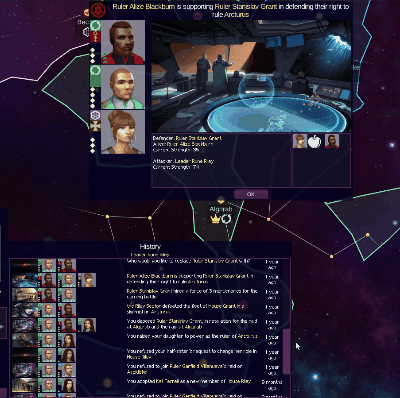 Flipping through historical updates Flipping through historical updates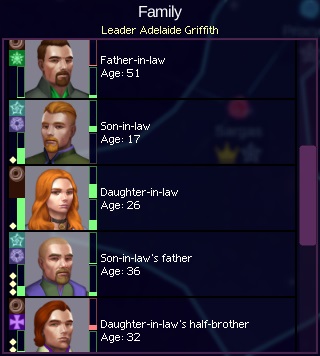 Browsing the list of related charactersSmoothly Scrolling Lists Browsing the list of related charactersSmoothly Scrolling ListsThe main challenge was performance; I'm using ScrollRect objects in Unity and they are surprisingly slow. I'm not just talking about the need for object pooling (where you reduce the number of game objects used to render a list by re-using a small number of them to populate just the visible portion at any one time), but in the way ScrollRect inherently functions. To the best of my understanding a ScrollRect recalculates the layout of its contents and rebuilds each graphical element every time the scroll position is changed. The implication is that if you're going to use a ScrollRect and want smooth scrolling, you need to make sure it's contents are as lightweight as possible for Unity to rebuild. One of the components I am using liberally in the UI is the character card, a character portrait with some decoration, to give you at a glance; Faction affiliation, House affiliation, the character's general importance (i.e. are they a leader, a ruler, etc.), the character's happiness, your opinion of the character, and the character's opinion of you.  Character Card Character CardIn the History panel list, I can have up to four of these character cards per row. The control was using an "Auto Layout" based layout, and I got a significant speed up switching to a RectTransform based layout (i.e. where I calculate the position of each element manually once rather than let Unity dynamically recalculate it each rebuild). The other tweak that seems to have helped considerably is an implementation detail of how I was doing object pooling on the list itself. It turns out that changing the parent of a UI element also triggers a significant amount of rebuilding, so it is cheaper to leave one or two masked out list elements past the edge of the visible area, rather than temporarily reparenting them to somewhere else until they are reused to show new items. Sharper Text RenderingI'm using TextMeshPro to render the text, primarily because I need the ability to embed links and sprites within the text (I'm under the impression that TextMeshPro is also generally the most robust text rendering solution available for Unity). A weakness of all the text renderers in Unity I've tried is that they struggle with drawing small text sharply. The text ends up looking quite fuzzy, rather than nicely anti-aliased but still sharp. The only solution that I can see (at least with TextMeshPro) is to find or roll your own bitmap fonts that are of the exact size you need and use them at the explicit size they were designed for (i.e. no scaling at all of either the canvas, game object, or text component font size). If you want text at different sizes you will need to use different bitmap fonts at each seperate size, but the results are then pixel perfect. And past a certain size, TextMeshPro's ability to dynamically resize a font works just fine.  |
|
|
|
|
 Logged
Logged
|
|
|
|
|
GPawley
|
 |
« Reply #6 on: May 19, 2017, 02:48:20 AM » |
|
I have been working on the information panels the player will use to explore the state of the world, so this feels like a good opportunity to provide a quick tour of the basic systems of the game. Justice / MoralityOne of the core features of the character simulation is the concept of moral acts, i.e. actions such as declaring war, cheating on your wife, helping a family member in need, etc., that will trigger a universal condemnation or approval. An example of a non-moral act would be marrying off your son - the newly weds and new in-laws will be happy and pleased with you (presumably), but the rest of the world won't really care. With moral acts, the world is watching and reviewing it's opinion of you. On top of that, many moral acts will result in someone bearing a grievance (the victim of the action) or someone owing the doer a favour (the beneficiary of the action). The value of this "social memory" is that it modifies how subsequent moral acts are interpreted. For example, deposing one of your rulers from power is an immoral act, and will usually trigger a widespread opinion change against you for being tyrannical. However, imagine a narrative where the ruler had recently refused to muster their forces and come to your assistance during an attack by another faction. This was an immoral act that granted you a grievance. If you move against the ruler now and depose them, your action will be seen as justified... a punishment of the ruler's misdeed. 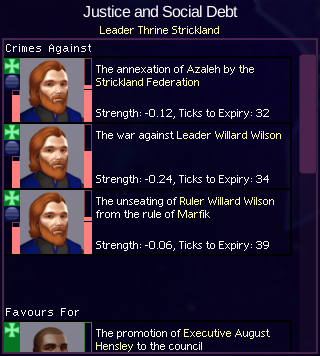 You’ve been quite nasty to Willard WilsonVisibility and Secrets You’ve been quite nasty to Willard WilsonVisibility and SecretsVisibility is an important part of the game. Your visibility is limited to the visibility of your character, so at any one time you will only see a small portion of the galaxy and its inhabitants. This can lead to some interesting consequences. For example, if your heir is a widely travelled ambassador, you will have a much larger awareness of the world around you when they inherit. If instead you keep your heir locked away in some unimportant role on your home system, you may find that your view of the world shrinks when they take the reins. As a general rule, if you know of a character then you have full visibility of what they get up to. There are some explicit exceptions to this rule, for e.g. committing murder, which are secret. Secrets stick around in the background and can be discovered by characters with a high Security skill (or by your house's Security wing), and subsequently revealed to inflict political damage.  Naughty naughtyHouses Naughty naughtyHousesApart from characters, houses are the most important unit in the game, and most of your political dealings will be with the heads of these houses, be they the ruling houses of colonies, the leading houses of factions, or lowly noble houses that vie for power within a colony. Within a house, characters can be assigned to a role from Administration, Military, Diplomacy, Security, and Medical; with one character in each area appointed as the council member of that area. Right now, the members you have assigned in these areas largely contribute passively to your house's attributes (e.g. Administration increases your income, and Military increases your combat bonuses), but the plan is to flesh out these systems so that each role has it's own narrative building blocks. For example, characters assigned to Diplomacy can be sent as ambassadors to other houses. An ambassador could (based on their skills and relationships) create a rapprochement with a rival or commit a faux pas that triggers conflict.  House Glass focuses on administration and diplomacyClaims House Glass focuses on administration and diplomacyClaimsWhen a dynasty has ruled for a long time, it's head acquires a legitimate (and inheritable) right to rule or lead particular systems. Claims interact with the morality system in that it is generally considered immoral to replace the ruler or leader of a system with someone who has less of a right to rule that system. But if someone has no legitimate claim, then they are mostly considered fair game. Similarly, if you can find someone with a strong claim on a system, you can use them as a political excuse to declare war (although you'll still suffer politically later if you annex other systems). 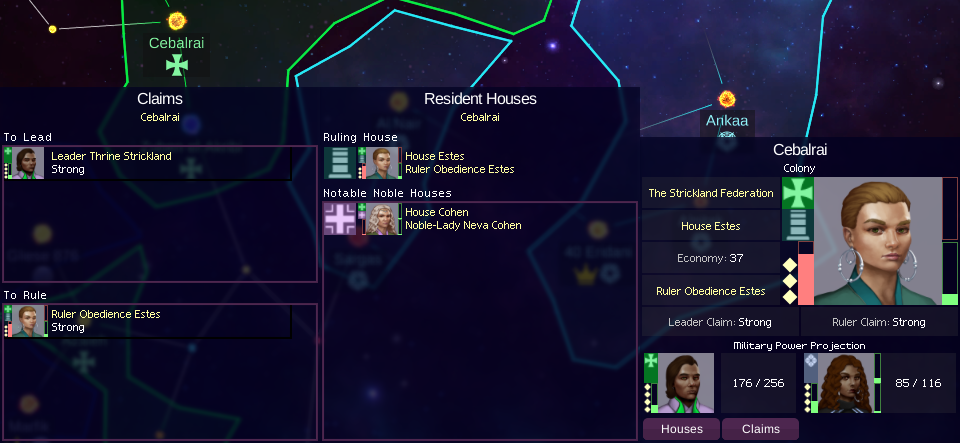 Cebalrai is claimed only by it’s current owners, so there is no way it can be acquired without political falloutFactions Cebalrai is claimed only by it’s current owners, so there is no way it can be acquired without political falloutFactionsFactions are the highest level of social grouping of the game and relationships and conflicts between factions will generally be the most important strokes of the narrative you play through in the game. 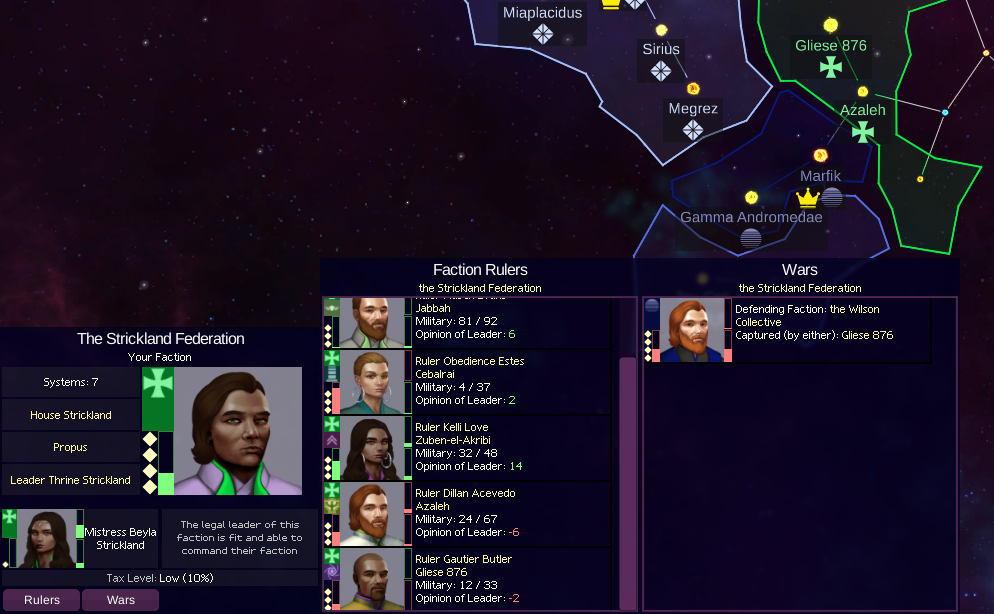 Leader Strickland retains tepid support from his followers despite the war with the Wilson Collective Leader Strickland retains tepid support from his followers despite the war with the Wilson Collective |
|
|
|
|
 Logged
Logged
|
|
|
|
ColonelMustache
Level 0


|
 |
« Reply #7 on: May 21, 2017, 12:22:45 AM » |
|
It looks very professional. Sounds like what Stellaris should have been. Keep up the good work!
|
|
|
|
|
 Logged
Logged
|
|
|
|
|
Caravaggio
|
 |
« Reply #8 on: May 21, 2017, 01:05:10 AM » |
|
Cool to see an emphasis on a Crusader Kings-like game. Strong character connection is something that I always wondered about in those games.
Curious what your goals are for the look of the final version? Similar to what you already have with the clear lines / circles or more of a Sins of a Solar Empire thing where we can zoom in and see basic planet / ship designs?
|
|
|
|
|
 Logged
Logged
|
|
|
|
|
fingerman
|
 |
« Reply #9 on: May 21, 2017, 08:25:56 AM » |
|
Hi, looks cool. Have you read Frank Herbert?
|
|
|
|
|
 Logged
Logged
|
|
|
|
|
GPawley
|
 |
« Reply #10 on: May 21, 2017, 11:48:40 PM » |
|
Thanks for the positive comments, it's nice to get encouragement  Curious what your goals are for the look of the final version? Similar to what you already have with the clear lines / circles or more of a Sins of a Solar Empire thing where we can zoom in and see basic planet / ship designs?
I will probably stick to something similar to what you can see at the moment, although I would like to polish it further in future. For example, there's a modern trend to project the stars onto a plane that tilts as you zoom rather than one that stays parallel to the camera - that may be a good improvement. At this stage the lowest level of granularity of the simulation is the star system, so there wouldn't be much value in having a zoom that goes into the planets of a star system. You also alluded to units on the map, and there is an interesting discussion about how units will work in general. I'm making a design decision to avoid tactical combat elements and focus purely on the political/interpersonal/drama aspects. During a combat "phase" the interesting decisions are working out who's going to help who out (honoring committments / betraying / throwing support behind / etc) rather than moving units around a map to strengthen an area, or matching up a weapon type against an armor type. As a result, units are heavily abstracted and don't actually appear on the map. It's perhaps a little risky as a design decision because tactical unit maneuvering is such an expected component of strategy games, but on the other hand I hope to leave myself open to a wider audience that would enjoy the political/character/rpg elements but is not interested in tactical strategy. If I get a lot of adverse feedback then I will adjust. Hi, looks cool. Have you read Frank Herbert?
Definitely. Dune is one of my favourite novels of all time. As THE feudal scifi fictional universe (at least in my mind), Dune is definitely an inspiration. Now the universe of Dune is a very "mature" one in that the empire has grown to thousands of stars, there is a vast galactic economy, etc. In contrast, Star Dynasties is a very frontier universe where the colonies are small industrial installations that have been repurposed to also be the living space of the remnants of humanity. So the scale of the universe is smaller. Politically it's also fragmented - i.e. the main dimension of conflict is between leaders that rule over sets of stars independently, not houses within an empire vying for power (although I hope to model the latter as well). |
|
|
|
|
 Logged
Logged
|
|
|
|
|
GPawley
|
 |
« Reply #11 on: June 03, 2017, 01:53:11 AM » |
|
I've been out of the country visiting my folks so progress since the last post has been slow. I've built a few more basic UI screens for the game, but I thought I would talk about something relatively done and dusted - portrait generation. Characters are the central focus of Star Dynasties, and bringing them to life visually is an important design goal. The game generates over a thousand characters for a game, so portraits also have to be generated dynamically.  Dynamic portrait generation Dynamic portrait generationPortraits are assembled from a library of sprites designed to stitch together seamlessly. Each component of the portrait is drawn on a seperate layer in a pre-determined order to create a human face. Some of these components are handled as multiple sprites. For example, the hair component is split into two seperate sprites; one is drawn beneath the face, the other is drawn on top of the face. Most components are also re-colored to further differentiate characters from each other; allowing for a dynamic range of eye colors, skin colors, dress colors, etc. One complexity stems from the fact that through the game you will play through the lifetime of many characters. Thus characters age, and their facial features must age appropriately. Some features (such as eyes) change significantly as we age, so we need a version of each different type of eye sprite for each age group that we are representing in the game. Some other features age more slowly, so we can get away with less granular modifications. In addition, hair color changes as we age, so hair color is lightened for older characters. There are other less immediately noticeable aspects of portrait generation that I hope players will appreciate as they become familiar with the game. - Facial feature sprites for male / female faces are drawn in matched pairs. This allows me to have children that inherit features from both mother and father, and leads to entire families that share facial similarities.
- Dress color is picked so that it advertises the affiliation of the character to their house. Characters of a house whose flag is blue will be wearing blue and yellow, blue and green, different shades of blue, etc. Seeing all the characters of a house in one list will show a clear chromatic theme.
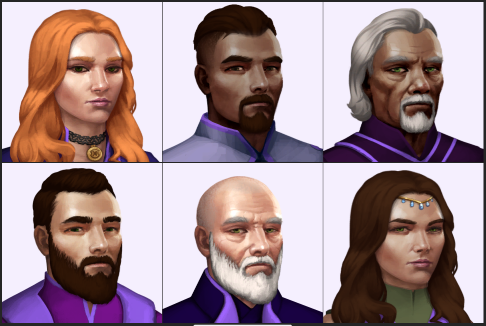 Characters in house with violet flag Characters in house with violet flag |
|
|
|
|
 Logged
Logged
|
|
|
|
|
GPawley
|
 |
« Reply #12 on: June 19, 2017, 05:55:12 AM » |
|
I've been working on building support for the two separate game modes that Star Dynasties will have, but in trying to write a post about it I've realized I first need to talk about the fundamental concepts and vision of the game. What is Star Dynasties about? A game about being a king that focuses on human drama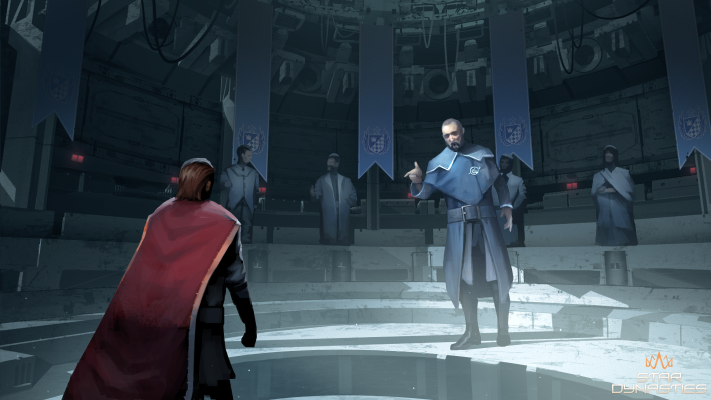 The initial spark was the thought, after countless playthroughs of Civilization and other classic strategy games, that history (particularly ancient and medieval history) looks very different from the narratives that arise in those games. Kings and emperors were much more dependent on social and political skills than they were on their technical and administrative skills. And in societies where political power was primarily personal or dynastic, kingdoms rose and fell as much on the basis of human foible and drama as on the basis of economic and military strength. Alliances were built on personal charisma and friendships, wars have been fought over a lover, thrones have been lost through social ineptitude, rebellions have started from feuds between a monarch's rulers and their personal friends, etc. It's this personal dimension that makes a lot of history, fantasy, or future feudal sci-fi fascinating. When you strip away the context of a story about a medieval or fictional monarch, the narrative is full of human experiences that we can relate to. A king worrying about his heirs is no different from any father wanting the best for their children's future. Acts of personal betrayal or indiscretions that lead to the ruin of a realm or royal dynasty, may be events with much higher stakes and on a much grander scale than our lives, yet in their essence there is something that resonates deeply with our own human experience. A simulation of a feudal society that generates believable narratives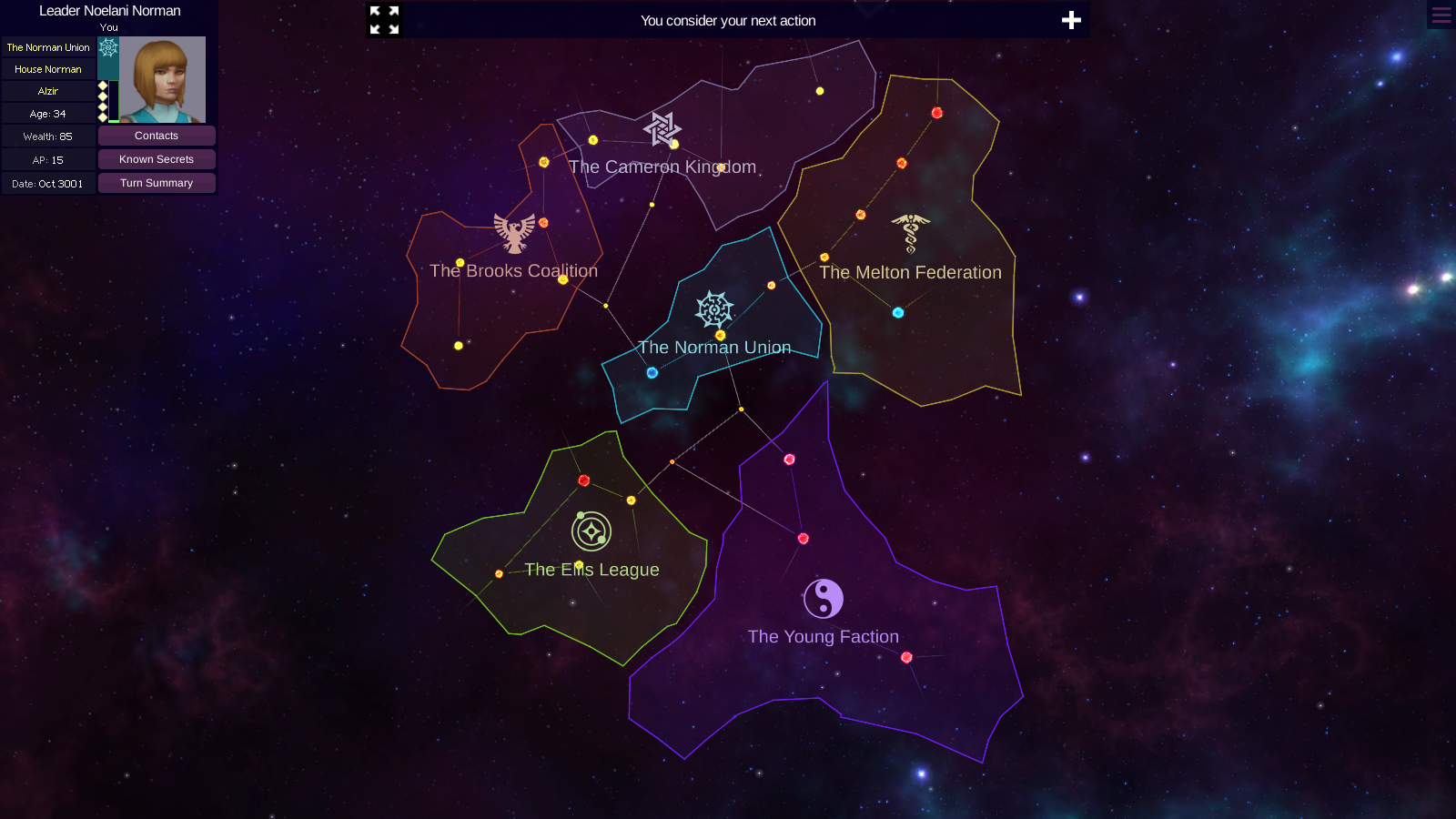 There is something deeply fascinating in observing, and interacting with, a complex system. In part, the "fun" of playing a game is the sheer thrill of working out patterns, and manipulating them to achieve certain goals. And what can be more complex, yet universally resonant, than a human society; with all those individuals trying to live out their own lives, seeking happiness, avoiding isolation and pain, and bending the rules and culture of that society to their personal benefit and wellbeing? Games such as Dwarf Fortress and RimWorld have proven that you can generate elaborate and convincing stories from a world simulation that reaches a certain level of complexity. When a player experiences two events in succession, they will inevitably link them in their minds in a story, especially if the events have a logical sequence in a narrative sense. For example, if in the first event character A does something nice for character B, and in the second event character B does something nice for character A, any human observer would say that this is a reciprocation and that the two events are linked, even if the second event was not triggered explicitly by a simulated "reciprocity rule". The fact that the player perceives the two events as a quid pro quo is an emergent property of the simulation, rather than something that was necessarily explicitly coded in the simulation rules. This is also true for more complex event chains; a sequence of negative acts that happen to escalate will appear to be a planned strategy of conquest or harassment, a sequence where positive acts are unrewarded at a critical moment will appear to be a betrayal. The critical prerequisite is to make sure that the sequences of events that occur in the simulation are not unbelievable or immersion breaking - we can then trust the human brain to do the rest. A feudal frontier sci-fi setting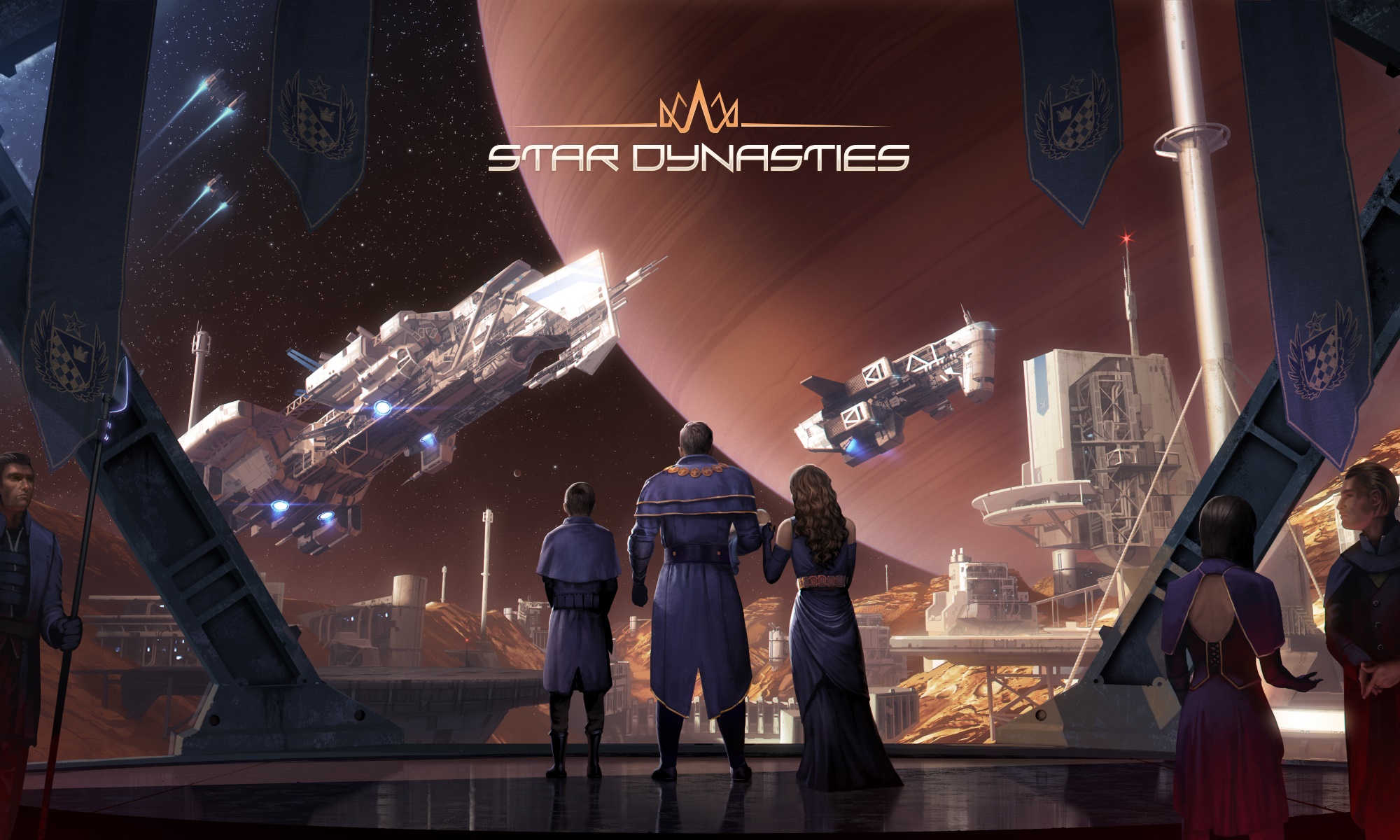 The choice of a science fiction setting allows for interesting design decisions or world building that would not be possible in a historical setting. I love sci-fi because it creates what-if scenarios that couldn’t be set up in a historical context, and it allows us to strip away ancillary details to focus on the core properties of a social or political pattern. Furthermore, it provides the freedom to solve some knotty game design or implementation problems by altering a detail in the setting. For example, Star Dynasties has a population control mechanic that serves both to limit runaway population growth in the simulation over time, and provides an interesting political tool by which you can reward your favourites. At the same time, it’s important to note that the requirement to model a realistic feudal system that persists through multiple generations does create some hard constraints. Marriages and kinship relationships are the key enablers of legitimate power transfer and alliances, the economy must be land-locked (or planet-locked) and relatively disconnected to maintain the long-term stratification of the society, technological growth must be relatively stagnant, etc. Similarity to existing games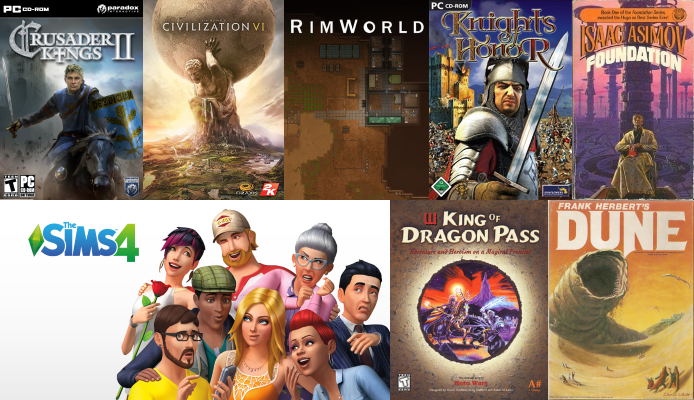 Star Dynasties was inspired originally by a love of empire management strategy games such as Civilization, Total War, Knights of Honor, etc. In choosing to focus on the human drama, I have drawn inspiration from roleplaying simulation games such as The Sims, King of Dragon Pass, and choose your own adventure-style games such as Nation States and Reigns. In understanding how complexity creates emergent narratives, games like Dwarf Fortress and RimWorld have been instructive. The game that shares the most concepts and similarities with Star Dynasties is Crusader Kings. To the maximum extent possible (I am a solo dev with some help), my intention is to build a game that has an even greater emphasis on, and mechanistic understanding of, stories of human drama. For example, the simulation in Star Dynasties understands the notions of empathy, simplistic morality, social obligations, grudges and favours; and uses that to build logically consistent sequences of events. I would also like the player experience to be focused on navigating a branching narrative that rewards strategic thinking, with less administrative micromanagement tasks such as troop movement. |
|
|
|
« Last Edit: June 19, 2017, 07:08:12 AM by GPawley »
|
 Logged
Logged
|
|
|
|
|
GPawley
|
 |
« Reply #13 on: June 23, 2017, 12:54:23 PM » |
|
Hi – I am a playtester for Star Dynasties. To show what the game is like to play, I am writing a series of AARs based on the current prototype, warts and all. Star Dynasties is in development, so some of the game systems are incomplete or might work differently as we evolve the game. Hope you enjoy! ChristineAAR - Katie Blond - #1A Young Leader with a Lot to ProveWell … this is me … Katie Bond Leader of my own faction at just 25 years old, inherited when my father died at 44 years old. 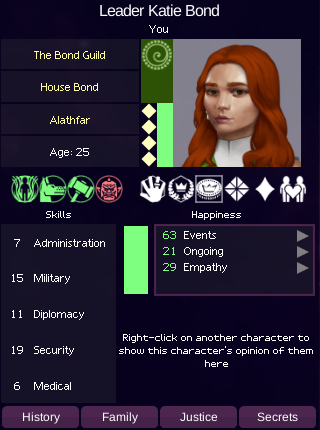 Katie Bond Katie BondI am compassionate, loyal and accountable, but unfortunately, I am also hideous apparently! Note: we are going to change ‘hideous’ and ‘beautiful’ as personality characteristics to something less physical because the values are not sync’d up with the portrait features and Katie clearly isn’t hideous.I am surrounded by relatives who don’t seem to like me much, and therefore I don’t quite trust – including my half-brother who is next in line to rule if I meet an untimely death. Just before he died, my father arranged a marriage for me and thankfully, my husband and I have good opinions of each other (+89 and +49 respectively) and are very happy to be married. Given how precarious my political position is, it looks very much like it is the two of us against the rest of the world as I start my rule. 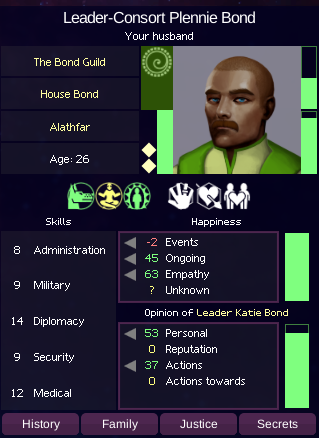 Leader-Consort Plennie Bond Leader-Consort Plennie BondRather dashing isn’t he! I like the way his green eyes match his outfit (green is our faction’s symbolic colour) My faction is called The Bond Guild …. I am the area marked in green on the star map, my domain is sandwiched between The Ayers Clan faction who are more powerful (blue borders), and The Gamble Union faction who is about the same military strength as me (purple borders). 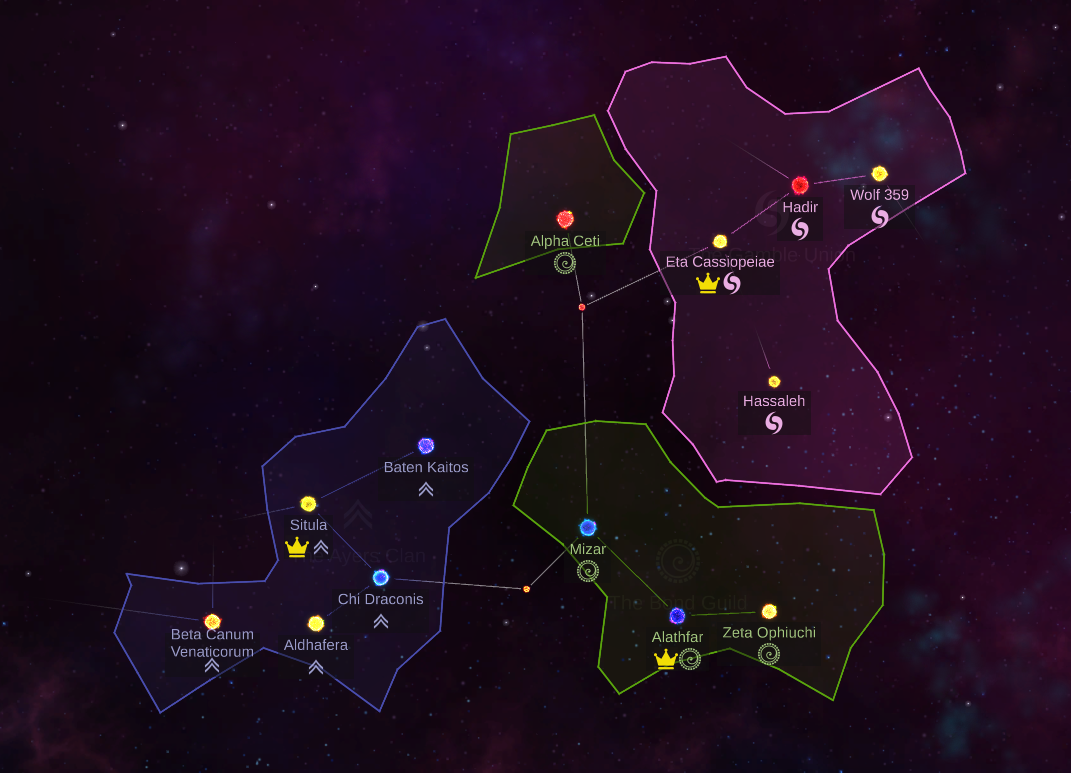 Star Map Star MapMy home colony, Alathfar, is the capital of my faction and I own three adjacent colonies whose rulers have sworn allegiance to my house (presumably to my father), and therefore now to me. Unfortunately, my rulers and I have pretty low opinions of each other, so their loyalty and willingness to keep me in power is a concern too! It’s not great that Alpha Ceti is out on a limb by itself, luckily there is no direct star lane to Baten Kaitos, but it is vulnerable to attack from Eta Cassiopeiae. 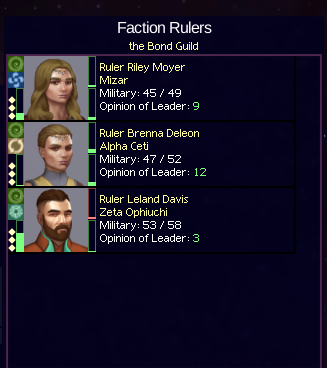 My Rulers My RulersMiserable bunch! My priorities are going to be to keep out of any skirmishes in space, and try to improve my political power at home by having babies to replace my half-brother as my heir, and being really really nice to my rulers and key members of my family on my own colony to build some goodwill and support! Play ModeI am playing Star Dynasties in Story Mode, which means that I am presented with 3 possible actions that I can take (or I can skip without taking any action if I prefer) and the story moves on. The game engine selects three actions which are in keeping with my character, and most likely to lead to outcomes which benefit me. This leads to some interesting dilemmas because I can only choose one of the three actions presented (or none), and there is no guarantee that I will see the other two choices again any time soon since my circumstances will be changed by my actions and by other characters in the simulation!Action 1So … let’s make my first move as leader. 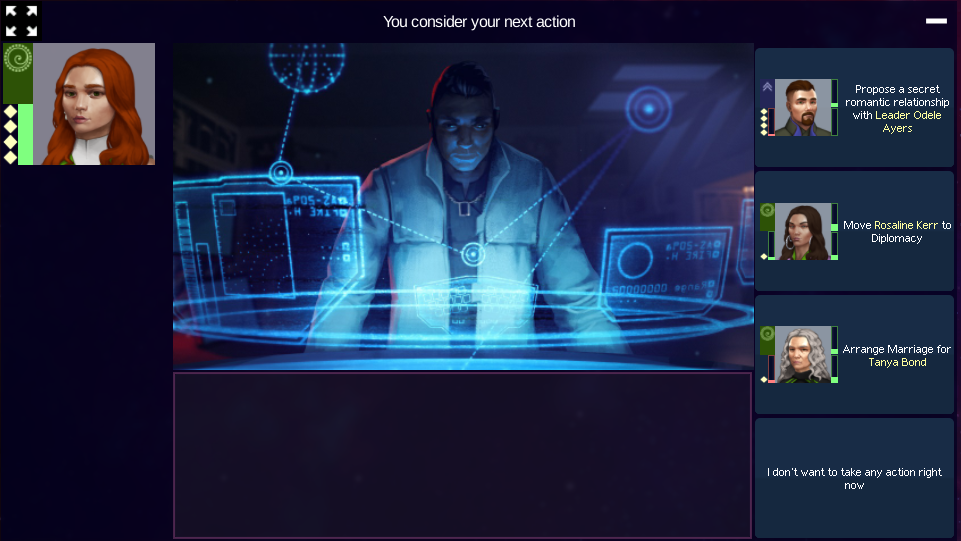 Choice of ActionsChoice A Choice of ActionsChoice A – I could suggest a romance in secret to one of my neighbouring faction leaders, Leader Odele Ayers. Interesting that the AI thinks this is a good idea given that my husband is the only person in the world that likes me so far, and I suspect that might change if he found out I was having a clandestine love affair! To be fair, I am weak militarily – so using my womanly ways to try and entice a stronger leader to be my lover (and therefore, hopefully, ally in battle if I’m attacked) might not be such a stupid idea after all? (Note: The ability to suggest a secret fling to other faction leaders currently may change as we flesh the romance system out. Not sure it makes sense to have secret long-distance relationships like this.)Choice B – I could give my stepmother, Rosaline Kerr, a role in the Diplomatic wing of my house. Rosaline is one of the more supportive of my kin, so it is probably worth giving her a position of greater influence and status in my house. Choice C – I could arrange a marriage for my grandmother, Tanya Bond Nothing against my grandmother, but she is 60 years old and arranging a marriage for her will not be too easy because she is past child-bearing age. Frankly, I have bigger problems of my own to fix … sorry Granny! Taking My First ActionHaving quickly ruled out C, I did a bit of background research into the other two choices.  History Log History LogOooooh …. that’s interesting, I can see that a year ago Leader Ayers had proposed a marriage between our two houses which my father rejected, involving me and someone I don’t know in Leader Ayer’s house. Leader Odele Ayer’s opinion of me is a meagre +1 but this is actually due mainly to differences in our personalities – he doesn’t like me because I am hideous, and he is gorgeous, and on top of that he is unfeeling (what a narcissistic snob!) Well … I wasn’t keen on being a baddy and cheating on my lovely husband (and future father to my children) anyway, but I will definitely ignore A now because it is highly unlikely that Leader Ayers would accept my offer of an illicit romance. 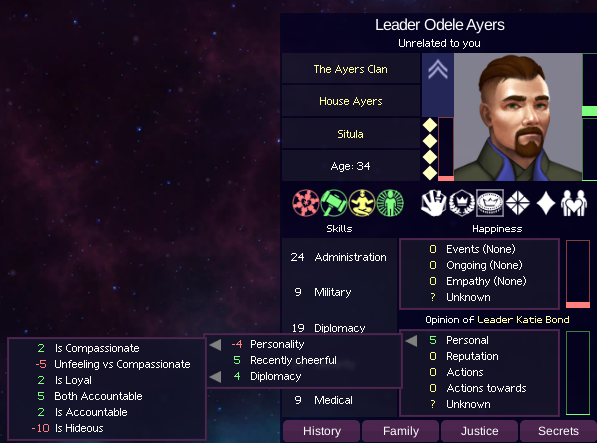 Leader Odele Ayers Leader Odele AyersSo … B looks like the option to take. I’m happy with taking this action because it should make Rosaline happier and increase her positive opinion of me as a result. She was acting leader of my faction when my father was unwell for a few months, and she did not cause any trouble for me when my father died and I legally inherited his faction leadership. So, all in all, I think she’s likely to remain on my side and I should cultivate her goodwill. Note: In the version of the prototype I am playing today, Rosaline wasn’t actually pleased with being given the Diplomacy role, but it is on the roadmap to modify character happiness for this action up or down before the game goes public (possibly based on match with their skills and ambition).Assigning characters to roles, and establishing council members for each role strengthens the effectiveness of my house to operate, so B is a good action to take for this reason too! Most of my house members are idling their time away, doing nothing useful so that is what I will focus on next!  My House Members My House Members |
|
|
|
|
 Logged
Logged
|
|
|
|
|
Zireael
|
 |
« Reply #14 on: June 24, 2017, 02:30:03 AM » |
|
That's a really nice AAR.
A big thumbs up on the decision to rename beautiful/hideous.
For beginner players, maybe introduce an advisor or two who hint that marrying off Granny is not easy and that secret romance isn't a good idea either? (in that case)
|
|
|
|
|
 Logged
Logged
|
|
|
|
|
justincavenagh
|
 |
« Reply #15 on: June 24, 2017, 04:38:19 AM » |
|
Excellent work! This is one of the most professional dev logs I've seen. Looks like you have your head screwed on straight and you have a great game to boot!
|
|
|
|
|
 Logged
Logged
|
|
|
|
|
GPawley
|
 |
« Reply #16 on: June 25, 2017, 11:27:57 PM » |
|
That's a really nice AAR.
A big thumbs up on the decision to rename beautiful/hideous.
Excellent work! This is one of the most professional dev logs I've seen. Looks like you have your head screwed on straight and you have a great game to boot!
Thank you! For beginner players, maybe introduce an advisor or two who hint that marrying off Granny is not easy and that secret romance isn't a good idea either? (in that case)
This is an interesting point. Obviously the game needs to do a good job of explaining its rules and the social norms of the world to the player (e.g. that secret romances are frowned upon). But beyond that I'm not sure to what extent the game should help the player improve their ability to take a decision, given that making wise decisions is the core gameplay activity. So far I've opted for letting them learn through trial and error, with a dose of telling the player why something failed. For example, if you offer a marriage that is not accepted, the other character will identify why they refused the offer, which helps the player learn what is valued and not valued. A second aspect to this is simply the cost of implementing and maintaining actions / decisions. Its obviously costlier to add a decision specific advice system for most decisions (particularly one that understands the context of e.g. a marriage proposal). An alternative I am considering to help guide beginner players is a list of advisor hints that is not decision specific, but points out things that could use your attention in the short term / medium. |
|
|
|
|
 Logged
Logged
|
|
|
|
|
GPawley
|
 |
« Reply #17 on: July 01, 2017, 03:00:59 AM » |
|
I’m a big turn-based strategy game player, and a lot of the ideas behind Star Dynasties came from such games, including the way the player typically interacts with the game. You see a map of the galaxy, which you can explore to understand your situation and work out what are the most important issues that you need to address, or what the next steps are to achieve your longer-term strategy of succeeding in the game.  Galactic Map Galactic MapTo interact with the game, you have access to a global list of all the actions you can take, or you can click on specific entities in the galaxy (such as a character) and see a list of the specific actions you can take that are context-specific to that character. Your character has a set of action points that limits how many actions can be completed in one turn, and after you consume them (or when you feel there is no further good action to take) you choose to End the Turn. I call this more typical way to play the game Strategy Mode.  Full action list (top) and the context sensitive list (middle right)Another Way to Play Full action list (top) and the context sensitive list (middle right)Another Way to PlayAs I described in the post about the game's vision, Star Dynasties is designed to focus more on the human dramas of a feudal society in space, rather than the micromanagement of empire building or military conquest. A consequence of this focus is that actions are similar to events in a narrative rather than task instructions, e.g. “Find a marriage partner for John” as opposed to “Move Unit X from Sol to Alpha Centauri”. As I explored different ways to structure the UI, particularly trying to deal with early feedback that there was a steep learning curve to pick up the concepts of the game, I realized that the nature of the game’s action list allows the possibility of a seperate and complementary choose-your-own-adventure interface to playing the game, which I call Story Mode. Instead of giving you the full set of actions to explore, the game presents you with 3 possible choices which the AI calculates as the most realistic actions that your character would take next, based on their personality traits, and current situation (with the occasional curveball thrown in).  Choose which narrative branch you want to go down Choose which narrative branch you want to go downYou select one action, and take any further decisions required by the process flow of that action (e.g. marriage action asks you to choose a marriage partner). After the action is fully resolved, you are presented with another decision between three choices. At any time, you can elect not to take any of the actions offered, in which case this is equivalent to ending your turn. In most cases, however, multiple actions will be attractive and you will have to decide what to focus on, knowing that you may not get the same opportunities again as the simulation changes the world state. Furthermore, the UI proactively fetches the information that is most relevant to each decision. For example, if you are choosing between suitors in a marriage, as you mouse over each one, the UI will bring up that character’s details, their family, and their political house. Lastly, decisions with lots of alternatives are simplified down to the subset that the AI thinks are the best. In the marriage suitors example, the AI will shrink the alternatives down to the 3 that it thinks are a good match. It’s important to note that beneath the changes to the UI, it is the exact same game and world simulation. That said, the interaction mode you choose leads to two very different experiences. Contrasting the two ModesIn Story Mode, the game feels considerably more like a narrative in which you roleplay a character and guide their actions. Because the game does more of the legwork in filtering actions and presenting you with the information you need to take a good decision, it’s a more streamlined experience that allows you to focus on the story that’s unfolding. It’s also easier to pick up when you’re new to the game, or if you don’t have a lot of time to devote to it. In Strategy Mode, your ability to trigger actions that may be wildly out of character (such as declaring war on your best friend) gives you the freedom to choose how much you want to roleplay your character, or perhaps play the game in order to conquer the galaxy or build a powerful dynasty across the generations. It can also be more satisfying if you enjoy exploring the world and it’s detail at your own pace. I believe that most players will be naturally drawn to one mode or another, although not necessarily the one they expect - despite my background as a strategy game player I’ve found myself thoroughly enjoying Story Mode. There is of course a cost, and a design risk, in implementing two interaction modes instead of one. However, I am hoping that this is outweighed by the potential reward of engaging two complementary audiences. |
|
|
|
|
 Logged
Logged
|
|
|
|
|
Zireael
|
 |
« Reply #18 on: July 01, 2017, 03:57:39 AM » |
|
Story Mode > Strategy Mode, at least to me.
You haven't mentioned whether the mode is a one-time choice at the start of a game or whether we'll be able to switch at the beginning of a given turn?
|
|
|
|
|
 Logged
Logged
|
|
|
|
|
GPawley
|
 |
« Reply #19 on: July 02, 2017, 01:03:14 AM » |
|
You haven't mentioned whether the mode is a one-time choice at the start of a game or whether we'll be able to switch at the beginning of a given turn?
I'm leaning towards the latter, but I'm not sure yet. |
|
|
|
|
 Logged
Logged
|
|
|
|
|
 Community
Community DevLogs
DevLogs Star Dynasties - Character Simulation in a Dark Age Future
Star Dynasties - Character Simulation in a Dark Age Future Community
Community DevLogs
DevLogs Star Dynasties - Character Simulation in a Dark Age Future
Star Dynasties - Character Simulation in a Dark Age Future
